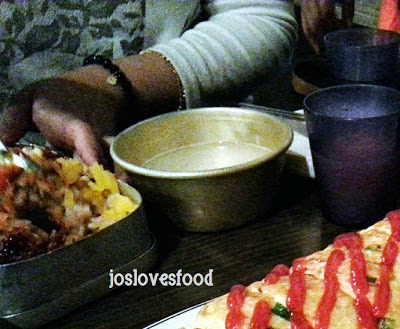Each country has it's own beverage. For Korea, there are 2 very popular alcoholic beverages - Soju (소주) and Makgeolli (막걸리). Let's talk more about Makgeolli. It is an ancient alcoholic drink that dates back a few thousand years ago. It is made from a mixture of fermented wheat and rice, native to Korea. It's alcohol content is about 6% to 8%. The drink is available off-the-shelve (in can or bottle form) and at the restaurant (in a bowl).
When consumed at the restaurant, the service staff may ask if you would like makgeolli or saeng makgeolli. The difference is that saeng makgeolli does not go through the heat sterilization process and thus, the micro-organisms in the drink isn't eliminated and as such, carbonic acid retains in the drink. The shelf-life is much shorter compared to sterilized (salgyun) makgeolli which typically last for about 6 months.
The taste of makgeolli is quite mild and goes down well quite easily with any food. Nonetheless, the alcohol content is still higher than beer, and for those who seldom, it is best to savour the drink slowly and enjoy the slight tint of rice taste. For the Koreans, it is common to see them drink makgeolli while eating pajeon (fried pancake).
How is it served in the restaurants? Makgeolli is served in a big bowl and they are scooped into the smaller cups for drinking, using the wooden scoop. The serving portion is about the size of 1 plastic bottle at approx. 750ml.
At more casual restaurants, the drink can be served in metal bowls.
It is said that makgeolli is a beneficial drink. It contains good bacteria that is similar to yogurt. According to the owner of Jeju Makgeolli, Mr Koh Sang Hoo, one bottle of makgeolli is equivalent to 100 small containers of yogurt. It is rich in vitamin B and is high in fiber.
If you happen to be in Jeonju, you may even get to see live demonstration on the makgeolli making process at the Jeonju Korean Traditional Wine Museum, which takes place on the 3rd Saturday of each month, at 2pm to 4pm. Details is available here (in English) and here (in Korean). ^^
In Singapore, Makgeolli is available at most Korean supermarkets and occasionally at local supermarkets.
[This post can also be found on The Korea Blog]


No comments:
Post a Comment
All comments are welcomed